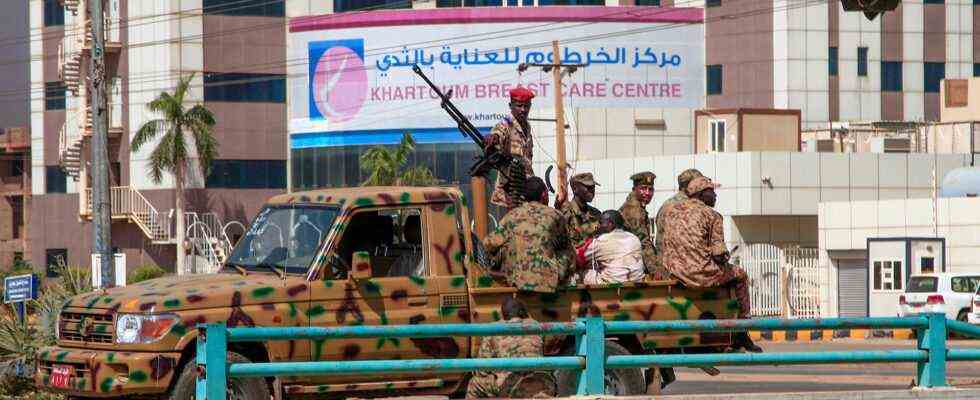Status: 25.10.2021 1:28 p.m.
The Sudanese military declared a state of emergency after the coup. Prime Minister Hamdok and other government officials were arrested by soldiers. Gun battles are reported from the capital.
The military in Sudan has declared a state of emergency on the north-east African country. General Abdel Fattah al-Burhan also announced the dissolution of the government and the Sovereign Council, which so far led the transition to democracy and which included members of the military as well as civilians.
Burhan, who himself was chairman of the council, justified the action by saying that peace and security in Sudan had been endangered. The military had to act to protect the security of the country. The military will continue the democratic transition until power is handed over to a civilian elected government. He announced an election for July 2023. Until then, an independent government should lead Sudan.
Daniel Hechler, ARD Cairo, on the current situation in Sudan
daily news 12:00 p.m., 25.10.2021
Government members arrested
Previously, Prime Minister Abdallah Hamdok was abducted by members of the military to an undisclosed location. The Ministry of Information, which was apparently still controlled by government supporters, said this on Facebook. At least five other leading government officials have also been arrested, according to local media.
According to the Ministry of Information, it is unclear where the government officials are being held. The army has switched off Internet connections and blocked bridges, the ministry said.
Skirmishes in Khartoum
Gun battles are reported from the capital, Khartoum. According to doctors, twelve people are said to have been injured. The Sudanese Professionals Association and the country’s largest party, Umma, called for resistance to the military. The Ministry of Information also urged people to take to the streets.
Apparently, many followed suit: videos are circulating from the capital and the neighboring Omdurman in which large crowds gather on the streets. Some of the protesters blocked roads and set tires on fire. Security forces responded with tear gas.
The EU and UN are concerned
The developments caused concern internationally: Federal Foreign Minister Heiko Maas condemned the coup. “I call on everyone who is responsible for security and state order in Sudan to continue the peaceful political transition process in Sudan towards democracy,” the minister said. The European Union called for the “quick release” of the arrested members of the government.
The US special envoy for the region, Jeffrey Feltman, expressed “deeply concerned” about the latest developments. The United Nations Special Representative for Sudan, Volker Perthes, also expressed his “deep concern” in a statement and called on both sides to enter into dialogue. The Arab League appealed to all parties to continue on the “path of democratic transition”.
“Military sees benefices in danger”
The freelance journalist and Sudan expert Tobias Simon said on tagesschau24that the military has had little popular support since the military leadership under ex-ruler Omar al-Bashir was ousted in 2019. Nevertheless, Prime Minister Hamdok fell out of favor with the population, as he abolished gasoline subsidies in the course of negotiations with the IMF over debt relief. This had led to popular protests for weeks.
He sees the military’s fear of losing power through democratization as the reason for the current coup: “The military elites see their benefices and their interests in danger. In addition, the military was never really ready to give up its claim to power completely.”
Tobias Simon, freelance journalist and Sudan expert, with an assessment of the situation in Sudan
tagesschau24 11:00 a.m., 25.10.2021
Setback for the country
Should the military now take over power in Khartoum, it would be a serious setback for Sudan. The current interim government has moved closer to the West and in recent months has agreed on economic reforms with the International Monetary Fund. In order to obtain debt relief, however, the state also had to cut subsidies for diesel and gasoline, among other things. This led to the first protests in the impoverished country.
In addition, the transitional government decided in August to extradite the long-time ruler Omar al-Bashir to the international criminal court in The Hague. The bank accounts of representatives of the old corrupt regime were frozen, apparently these millions of dollars had been transported abroad.
Military coup in Sudan
Martin Durm, SWR, 25.10.2021 12:49 p.m.

